

Digital Research. Learning about Visual Notetaking from Giulia Forsythe. <div class="greet_block wpgb_cornered"><div class="greet_text"><div class="greet_image"><a href=" rel="nofollow"><img src=" alt="WP Greet Box icon"/></a></div>Hello there!
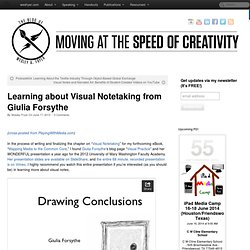
If you are new here, you might want to <a href=" rel="nofollow"><strong>subscribe to the RSS feed</strong></a> for updates on this topic. <div style="clear:both"></div></div></div> (cross-posted from PlayingWithMedia.com) In the process of writing and finalizing the chapter on “Visual Notetaking” for my forthcoming eBook, “Mapping Media to the Common Core,” I found Giulia Forsythe‘s blog page “Visual Practice” and her WONDERFUL presentation a year ago for the 2012 University of Mary Washington Faculty Academy.
Her presentation slides are available on SlideShare, and the entire 68 minute, recorded presentation is on Vimeo. Giulia Forsythe at Faculty Academy 2012 from umwnewmedia on Vimeo. Drawing on the Right Side of the Brain: The Definitive, 4th Edition by Betty Edwards Keys to Drawing by Bert Dodson. iPad Research in Schools. Last updated on 2/5/2014 Print this page1 The Technology Enhanced Learning Research group, led by Kevin Burden (Principal Investigator) based in the Faculty of Education, has completed the first national evaluation to investigate the use and impact of tablet technologies (in this case the iPad), across schools and homes in Scotland.
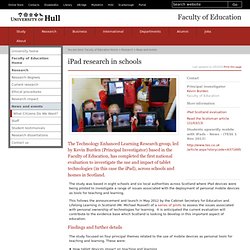
The study was based in eight schools and six local authorities across Scotland where iPad devices were being piloted to investigate a range of issues associated with the deployment of personal mobile devices as tools for teaching and learning. This follows the announcement and launch in May 2012 by the Cabinet Secretary for Education and Lifelong Learning in Scotland (Mr. Educational Technology Debate.
100 Excellent Open Access Journals for Educators. Just like physicians, the best educators stay informed with the latest developments in their field.
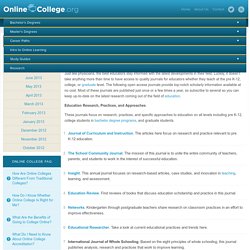
Luckily, it doesn’t take anything more than time to have access to quality journals for educators whether they teach at the pre K-12, college, or graduate level. The following open access journals provide top-notch scholarly information available at no cost. Most of these journals are published just once or a few times a year, so subscribe to several so you can keep up-to-date on the latest research coming out of the field of education. Education Research, Practices, and Approaches These journals focus on research, practices, and specific approaches to education on all levels including pre K-12, college students in bachelor degree programs, and graduate students.
Journal of Curriculum and Instruction. Education Policy and Issues Find out what is being researched and discussed when it comes to educational policies and issues when you read these journals. Education Next. Leadership Language Arts. Language Learning & Technology - Home. Many Eyes.
Even More Research: Technology Is Making Kids Better Writers, Not Worse. Open Access Journals in Educational Technology (and closely related fields) Integrating Online Tools to Motivate Young English Language Learners to Practice English Outside the Classroom (2155-7098)(2155-7101): Shelly Sanchez Terrell: Journal Articles. Abstract Recent research shows that online tools such as: games, wikis, speaking avatars, and interactive stories can be a positive force for English Language Learners (ELLs).
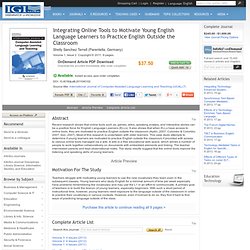
It also shows that when ELLs have access to online tools, they are motivated to practice English outside the classroom (Aydin, 2007; Colombo & Colombo, 2007; Son, 2007). Most of this research is undertaken with older learners. This case study attempts to determine if young learners are motivated to practice English outside the classroom if provided with access to various online tools managed via a wiki. A wiki is a free educational web space, which allows a number of people to work together collaboratively on documents with embedded elements and linking.
Article Preview Motivation For The Study Teachers struggle with motivating young learners to use the new vocabulary they learn even in the subsequent classes. Horizon Report > 2012 K-12 Edition. Www.nmc.org/pdf/2011-Horizon-Report-K12.pdf. Study Finds That Online Education Beats the Classroom. Docs/default-document-library/white-paper-final-9-22-2011-(1).pdf?sfvrsn=0. Literature. Study: Children Who Blog Or Use Facebook Have Higher Literacy Levels. A research by The National Literacy Trust on 3,001 children from England and Scotland showed that schoolchildren who blog or own social networking profiles on Facebook have higher literacy levels and greater confidence in writing.
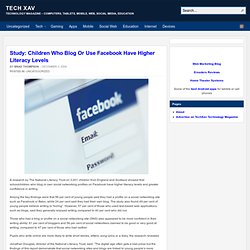
Among the key findings were that 56 per cent of young people said they had a profile on a social networking site such as Facebook or Bebo, while 24 per cent said they had their own blog. The study also found 49 per cent of young people believe writing is “boring”. However, 57 per cent of those who used text-based web applications such as blogs, said they generally enjoyed writing compared to 40 per cent who did not.
Pew Report: Teens and Technology 2013. The Data Digest: Mobile Online Activities By Generation. Having analyzed consumers' technology behavior for more than 11 years now here at Forrester, I've seen a certain pattern surface in the uptake of technology: When new technologies become available, it's Generation X (ages 31 to 44) that adopts it first, but it's Generation Y (ages 18-30) that runs with it. Gen Xers have money to spend on technologies when they're still premium-priced, but Gen Yers have the time on their hands to really explore all possibilities.
For example, when we look at online activities, young consumers spend more time online and are involved in more activities (especially when we look at social networking). However, for mobile Internet, we see a different pattern emerge. Forrester's Technographics® data shows that Gen Xers are equally active on their mobile phones, and in some instances, like playing games, they rival the usage of their younger counterparts. New technologies, new pedagogies: Mobile learning in higher education.
Jan Herrington, Anthony Herrington, Jessica Mantei, Ian Olney and Brian Ferry (editors), New technologies, new pedagogies: Mobile learning in higher education, Faculty of Education, University of Wollongong, 2009, 138p.
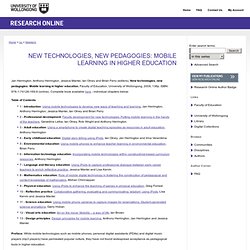
ISBN: 978-1-74128-169-9 (online). Complete book available here - individual chapters below: Table of Contents Preface: While mobile technologies such as mobile phones, personal digital assistants (PDAs) and digital music players (mp3 players) have permeated popular culture, they have not found widespread acceptance as pedagogical tools in higher education. The purpose of this e-book is to explore the use of mobile devices in learning in higher education, and to provide examples of good pedagogy.
The book begins with an introductory chapter that describes the overall project, its aims and methods. The chapters and full text are arranged alphabetically by author below: Follow. iPad more than a gadget. Wake Forest senior Kaela MacPhail ('11) teaches a lesson using iPad tablet computers in a kindergarten class at Ashley Elementary School in Winston-Salem, N.C.
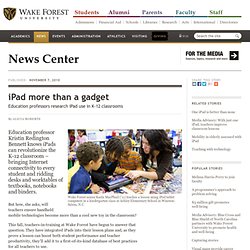
Education professor Kristin Redington Bennett knows iPads can revolutionize the K-12 classroom – bringing Internet connectivity to every student and ridding desks and worktables of textbooks, notebooks and binders. But how, she asks, will teachers ensure handheld mobile technologies become more than a cool new toy in the classroom? Table: Key Advantages of Serious Games/Immersive Learning Simulations. Playing with the Definition of “Game Thinking” for Instructional Designers Soon I will be presenting at the ASTD International Conference in Washington, DC.
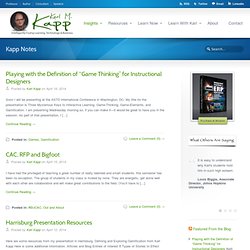
My title for the presentation is Three Mysterious Keys to Interactive Learning: Game-Thinking, Game-Elements, and Gamification. I am presenting Wednesday morning so, if you can make it—it would be great to have you in the session. As part of that presentation, I […] Continue Reading → CAC, RFP and Bigfoot I have had the privileged of teaching a great number of really talented and smart students, this semester has been no exception. Continue Reading → What do Students Think of Using iPads in Class? Pilot Survey Results. It's almost a year since the iPad was first released and we have been using them in a high school pilot program since September.
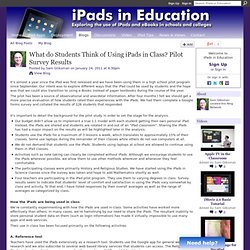
Our intent was to explore different ways that the iPad could be used by students and the hope was that we could also transition to using e-Books instead of paper textbooks during the course of the year. The pilot has been a source of observational and anecdotal information. After four months I felt we should get a more precise evaluation of how students rated their experiences with the iPads. We had them complete a Google forms survey and collated the results of 126 students that responded. It's important to detail the background for the pilot study in order to set the stage for the analysis. ASTD Webcast On New Mobile Learning Research (Watch Recording) ASTD conducted a free webinar on that research report this week.
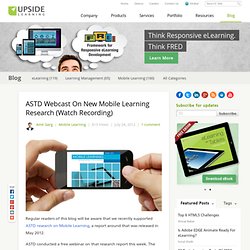
The speakers at the webinar were Kevin Oakes (founder & CEO of i4CP, earlier founder of Click2Learn which was merged with Docent to form SumTotal) and John Polaschek (Sr. Manager, Learning Technology at Qualcomm). They made some very interesting points during the webinar which resonated with what we’ve been sharing on this blog. Here are my key takeaways from the webinar, just in case you don’t want to go through the whole 69 minute recording of the webinar. Here's the video from that webinar: Tablets as part of mobile learning mixAlthough not the same as mobile phones, tablets are included in the study as part of mobile learning devices. Search Results. Vol 20 (2012) Learn about Children Technology on instaGrok.